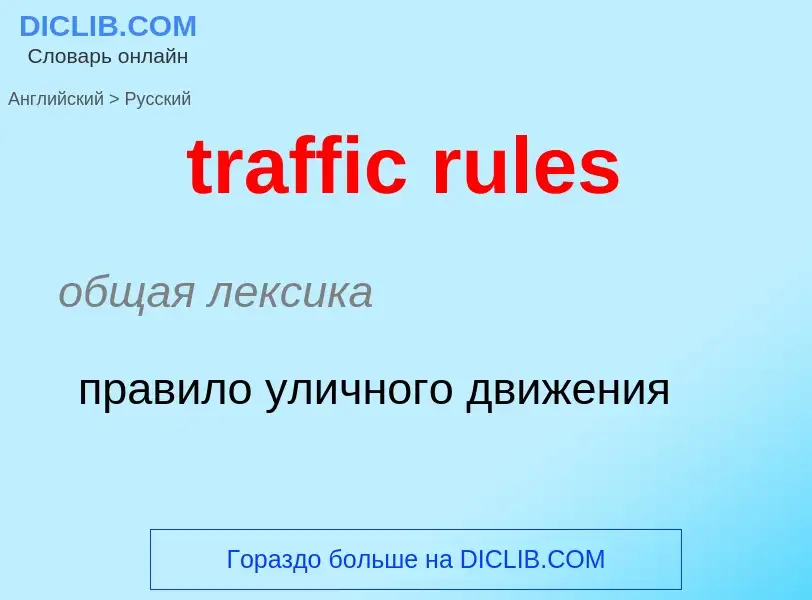Übersetzung und Analyse von Wörtern durch künstliche Intelligenz ChatGPT
Auf dieser Seite erhalten Sie eine detaillierte Analyse eines Wortes oder einer Phrase mithilfe der besten heute verfügbaren Technologie der künstlichen Intelligenz:
- wie das Wort verwendet wird
- Häufigkeit der Nutzung
- es wird häufiger in mündlicher oder schriftlicher Rede verwendet
- Wortübersetzungsoptionen
- Anwendungsbeispiele (mehrere Phrasen mit Übersetzung)
- Etymologie
traffic rules - Übersetzung nach russisch
общая лексика
правило уличного движения
общая лексика
дорожная сеть
транспортная сеть
общая лексика
дорожное движение
строительное дело
автомобильное движение
Definition
Wikipedia
.jpg?width=120)
Traffic comprises pedestrians, vehicles, ridden or herded animals, trains, and other conveyances that use public ways (roads) for travel and transportation.
Traffic laws govern and regulate traffic, while rules of the road include traffic laws and informal rules that may have developed over time to facilitate the orderly and timely flow of traffic. Organized traffic generally has well-established priorities, lanes, right-of-way, and traffic control at intersections.
Traffic is formally organized in many jurisdictions, with marked lanes, junctions, intersections, interchanges, traffic signals, or signs. Traffic is often classified by type: heavy motor vehicle (e.g., car, truck), other vehicle (e.g., moped, bicycle), and pedestrian. Different classes may share speed limits and easement, or may be segregated. Some jurisdictions may have very detailed and complex rules of the road while others rely more on drivers' common sense and willingness to cooperate.
Organization typically produces a better combination of travel safety and efficiency. Events which disrupt the flow and may cause traffic to degenerate into a disorganized mess include road construction, collisions, and debris in the roadway. On particularly busy freeways, a minor disruption may persist in a phenomenon known as traffic waves. A complete breakdown of organization may result in traffic congestion and gridlock. Simulations of organized traffic frequently involve queuing theory, stochastic processes and equations of mathematical physics applied to traffic flow.

.jpg?width=200)
![One-way traffic on Anawrahta road, [[Yangon]] One-way traffic on Anawrahta road, [[Yangon]]](https://commons.wikimedia.org/wiki/Special:FilePath/Anawrahta road traffic.jpg?width=200)
![Michigan Avenue]] in Chicago, Illinois Michigan Avenue]] in Chicago, Illinois](https://commons.wikimedia.org/wiki/Special:FilePath/Chicago 2007-4.jpg?width=200)
![Congestion in [[St. Louis, Missouri]], early 20th century Congestion in [[St. Louis, Missouri]], early 20th century](https://commons.wikimedia.org/wiki/Special:FilePath/George Bosche Produce Company wagon pulling out into traffic on Broadway near the corner of Cerre Street.jpg?width=200)
![This intersection in [[San Jose, California]] has crosswalks, left-turn lanes, and [[traffic light]]s. This intersection in [[San Jose, California]] has crosswalks, left-turn lanes, and [[traffic light]]s.](https://commons.wikimedia.org/wiki/Special:FilePath/Intersection 4way overview.jpg?width=200)
![An example of a typical rail crossing in the United States as an [[Amtrak]] Carolinian and Piedmont train passes through An example of a typical rail crossing in the United States as an [[Amtrak]] Carolinian and Piedmont train passes through](https://commons.wikimedia.org/wiki/Special:FilePath/NC train through Elon.jpg?width=200)
![[[Roundabout]] in a country where traffic drives on the right. Traffic streams circularly around a central island after first yielding to circulating traffic. Unlike with traffic circles, vehicles on a roundabout have priority over the entering vehicle, [[parking]] is not allowed and pedestrians are usually prohibited from the central island. [[Roundabout]] in a country where traffic drives on the right. Traffic streams circularly around a central island after first yielding to circulating traffic. Unlike with traffic circles, vehicles on a roundabout have priority over the entering vehicle, [[parking]] is not allowed and pedestrians are usually prohibited from the central island.](https://commons.wikimedia.org/wiki/Special:FilePath/NonUK Roundabout 8 Cars.gif?width=200)
![Traffic slows to a crawl on the [[Monash Freeway]] in [[Melbourne]], Australia through [[peak hour]] traffic. Traffic slows to a crawl on the [[Monash Freeway]] in [[Melbourne]], Australia through [[peak hour]] traffic.](https://commons.wikimedia.org/wiki/Special:FilePath/Peak hour traffic in melbourne.jpg?width=200)


